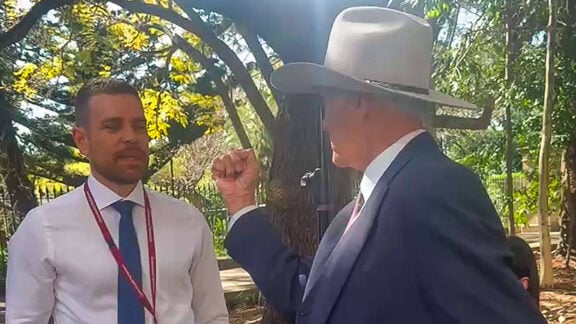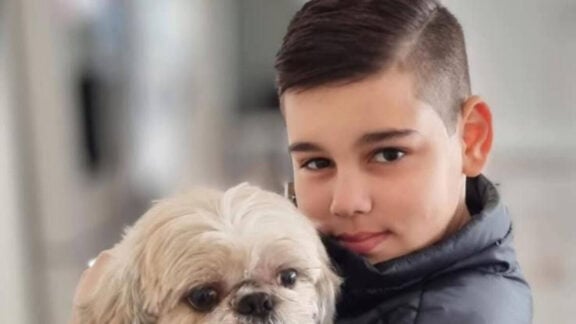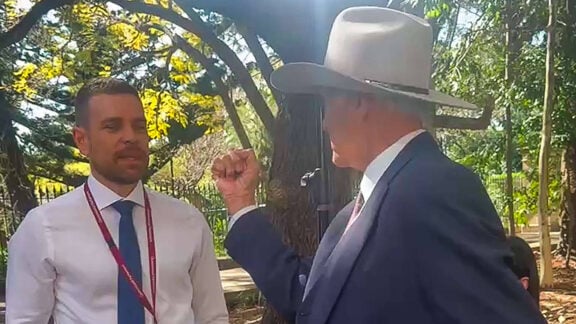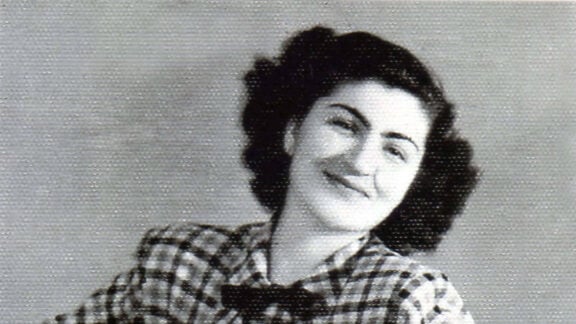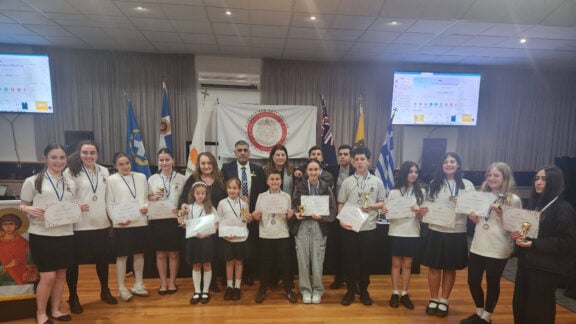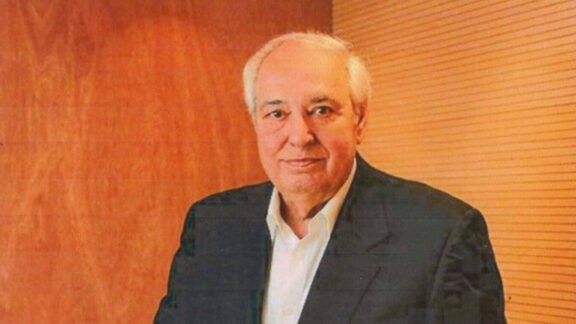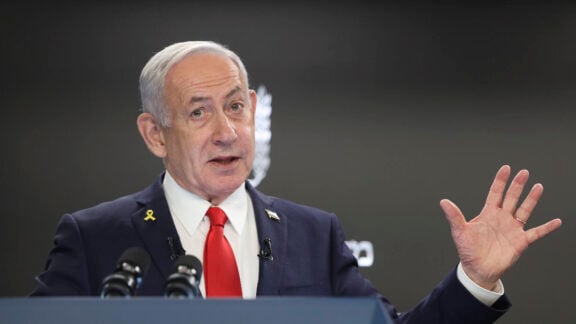Steve Maras is big. He laughs big and thinks big. It’s early July, and we talk over Zoom.
“Yiasou levendi”
“Where are you?” I ask.
“Naxos,” he says. His face ablaze in an all consuming smile, he moves out onto a balcony with his laptop. It’s 8:30 a.m. and summer.
“It’s beautiful here,” he says, then he flips the laptop to give me a 360-degree view.
The azure sky and the sun’s new morning rays are all I can see. It’s enough.
The day began at 3C and hit a high of 9C Melbourne.
A legacy of transformation: Following in Theo Maras’s Footsteps
Steve’s father, Theo,’the emperor of the East End’, as he is known after transforming Adelaide’s East End—has indelibly impacted Adelaide. The former president of the Greek Orthodox Community of South Australia (GOCSA), one of Australia’s most prominent business people, is now giving back.

Steve Maras was not destined to work with his father and yet he is now carrying the torch. He was carving his own path in property and business. He shifted into the family business for love and support. There he found a new mission bigger than professional ascendancy. He began to recreate Adelaide’s CBD, the polis, or city. Its economy, culture, and community.
Theo Maras, the patriarch, an former Adelaide Economic Development Agency (AEDA) member, now chairs the Adelaide Central Market Authority (ACMA).
“Theo is the chair of the ACMA, a subsidiary of the Adelaide City Council.”
“Your uncles and your aunties had shops in, remember?” Maras says.
Central Market is a palimpsest of migration. The Central Market needs to “care for memory while looking into the future,” says Maras.
The council has two subsidiaries, ACMA and AEDA, of which Steve Maras is Chair-Elect
“My role is to provide the best economic environment for the Adelaide City Centre, and North Adelaide”.

Revitalising Adelaide: From vacant spaces to vibrant communities
Maras’s mission since 2011 has been to revitalise Adelaide’s urban spaces through Renew Adelaide.
“I became friends with Marcus Westbury, who led Renew Newcastle, and he got support from council and government to fund creatives and young entrepreneurs as agents of revitalisation.”
“I met with young people who had a vision of doing something similar and I would talk to the more prominent property owners and say, ‘Hey, where you’ve got a vacancy, where you can’t lease something, let’s put someone in who’s going to then make your tenancy look more attractive’.”
Adelaide is now “confident” about what it is. “We were forever talking about ‘losing our youth’ or ‘the brain-drain’ to Interstate destinations and overseas, but I said, ‘Hang on, that is no different to any other city we’re in’.
“In Sydney, or Melbourne, nobody knows when you leave; somehow, it became an issue in Adelaide.”
AEDA funds Renew Adelaide “to do things right,” and Maras now has his eye on the rejuvenation of Hindley Street. The street has been occupied by massage parlours, strip joints and convenience stores, once it was full of Greek, Italian and Lebanese eateries, groceries, and cafes.
Adelaide has changed dramatically in the last 10 years and that has much to do with “being grown up in our thinking”.
“We don’t want to be Melbourne or Sydney, we’re not a big city, we don’t have the same benefits, or problems,” Maras says.
His efforts have seen Adelaide go from “zero small bars to 113 ‘barakia’ in the CBD”.
“That started to give people a reason to come to the city and go out, and do things.”

The complex path and sliding doors
Maras studied economics and accounting at the University of Adelaide in the late 1980s, he landed in Price Waterhouse at the age of 20 – insolvency at the height of the early 90s recession.
He then enrolled in a Graduate Diploma in Property at the University of South Australia, and then a master’s – all at only 23. His wanted to forge his own path.
“After 16 years at Price Waterhouse, Richardson & Wrench Commercial, Commercial & General [which he founded in 1996] then, Knight Frank, it all changed,” Maras says.
He joined his father in 2002 as a rift emerged between his father and his partner, Bill Manos.
“I wanted to help them, Bill was like a second father to me, and they are now close again”.
“Not an easy decision. I had set myself up and had a clear future in property, but now I had to make a call I thought I’d never make.”
By 2007 Steve was the Maras Group’s “inaugural CEO and Group Managing Director”.
Behind the ebullience, Maras has a family story to tell
“Papou Stamati”, from his father’s father, “was probably the biggest influence” on his life.
“They are from Ikaria – Ikariotes.
“My grandfather spent two years locked up in Makronisos,” Maras says.
Greece’s island of shame – the bleak prison island was where many who had fought to liberate Greece from German occupation during World War II were sent by Greek Royalists and fascists during and after the Greek Civil War 1945-49. Tortured and killed for their beliefs as the first victims of the new Cold War.
“He was staunch communist, and I learned a lot from him,” he says.
“Papou Stamati was often at loggerheads with my father – Stamati the communist and Theo the emerging capitalist,” he laughs.
“He was an engineer in Greece, and when he came to Australia in 1952, his qualifications, weren’t recognised.
“He had to work in a steel factory and the abattoirs at Gepps Cross, like the other Greeks”.
Steve Maras’s father, Theo, was two-years-old when they arrived.

His maternal side hails from Asia Minor and Kastolorizo, and they settled in Port Pirie in 1916. His grandmother, Despina, was “a trailblazer” Maras says.
“She arrived in Australia two years old in 1916.”
That is two years after an apocalyptic World War I and during the burning, murder, and ethnic cleansing of Christians, Greeks, Armenians, and Assyrians of in Asia Minor, by nationalist Ottoman forces and irregulars.
In Port Pirie her father took her out of school at around 12 or 13 “to work on the land”.
Despina was married through proxy at a young age.
“She read any book she could find, continued her self-education, and emerged an intelligent and powerful woman.”
She only had one child, Maras’s mother, Eleni. After a “tough marriage”, Despina divorced.
“Something not done in the 1950s”, he says.
“She was independent and built up a greengrocer, a toy shop, and haberdashery shops on The Parade, Norwood.”
Yiayia Despina re-married an ex-mariner 14 years her junior who “lived in her granny flat”.
“She was a ground breaker in women’s empowerment; resilient and made it through a tough life”.
Maras has not always been driven, he traces the “kickstart” back to 1982 at Pulteney Grammar School in year seven.

“We were given tests to determine for streams in year eight.
“I was a B-grade student, my friend and I didn’t take the test seriously. We failed and were placed in the bottom stream, which was essentially for students deemed to have little potential.
The teachers told us we “would need to take up a trade.”
Maras “put in two to three hours of homework each night” with his friend Michael Lucas.
“We topped the class, moved up to stream four, and continued to excel.
He wanted to “prove” himself to his parents, who were “struggling financially”.
“My father had lost everything in a bad business partnership –we had nothing and were living with my grandparents, but I was determined to make the most of the opportunities given to me”.
Giving Back: The personal drive behind living without limits
Challenges are not new to Steve Maras. His son Theo has autism and cerebral palsy. ” He’s high functioning, attends grammar school, and he does a special curriculum”.
“My koumbaro’s son, and my godson, is also autistic, so we set out to do something to help people, particularly those who may not have the financial means.
“In 2012, we set up a foundation called Living Without Limits, to assist families of children with autism and or cerebral palsy”.
One achievement is the House of Respite in Goolwa, a debt-free holiday house managed by Novita Children’s Services that provides respite for 52 families a year.
So, what advice would Maras give his younger self? “Don’t be one-dimensional. Have a creative vision.”
There is a caveat; “Give back and be a good person.”

